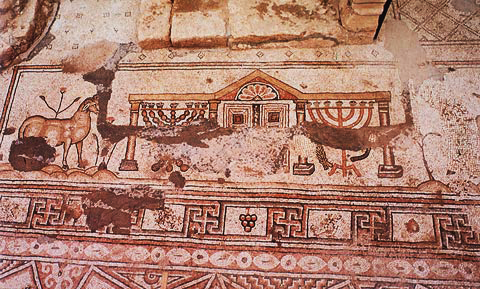Two Archaeological Poems
by Norman Simms (March 2018)

Mosaic floor in the Khirbet Susiya, 4th Century (credit)
An Old Synagogue Mosaic in Susiya
.jpg) have sat here many centuries, under the blazing sun,
have sat here many centuries, under the blazing sun,
once my roof collapsed, and then the sand
covered these wonderful mosaics, lovely colours,
images of piety and pleasure, such as one
might see in a far off rich and goyish land,
but eventually as they say, eventually time blurs
everything, and no one saw me anymore.
Then other settlers, not really very long ago
crossed over the river and built a village, used my name;
they never noticed me sitting here in the middle,
always waiting for the time to pass again,
and my own descendants to return and brush
aside the dust of centuries, until now, that is,
without the poetry of dreams or the piddle
of politics. I watch the scientists rush
to poke and measure what lay beneath the surface,
and while they don’t exactly appreciate my faith
inscribed in pagan illustrations, they
are my own people, finally, and claim
me as their own, while the others fiddle
with the law and turn time upside down
as though they were here first like the sand and dust,
eternal and natural, like the wind and the dervish swirl
of made-up history, violent and ephemeral
in ugly tents and vicious lies.
How I would hurl
invectives at these enemies and cast them down
in all their arrogance, but I am old and know a thing or two,
that what was not there ten years ago cannot now be true
and must learn patience yet again and bite my tongue,
though I could not have done that when I was young;
the poetry you see in these mosaics came from anger—
how fierce I was in the faith I had in God!
Now like the sands that slowly yield my face,
I sit here at the side and wait for your response.

Excavation of Philistine grave in Ashkelon National Park (credit)
A Philistine Cemetery Discovered in Ashkelon
.jpg) knew one day they would find me here in Ashkelon,
knew one day they would find me here in Ashkelon,
Where I was buried almost three thousand years ago,
And I am not ashamed to be seen here, now in my bones,
All other features missing with the passing time, and so
Let them say what they will about my people, Philistines,
That we were not all what they thought when they used
Our name to mock and scorn a nation without art or sense
Of beauty; we weren’t brutes devoid of culture,
And we had no dark propensity to evil crafts.
Nor was it even our fault that others came and found us foreign.
There had been a promise and they believed, but none
Of this was known to us when they swept in out of the South
And attacked our cities and our temples. In truth,
We could have fought together against the real enemies,
If only we both had the patience to listen to the wind.
But history already had decided otherwise, the earth
Could not be shared, no more than the voices that arose
Out of the depths in the places where we both lay down to dream.
If only I could express myself in such a way
That both our ancestors could hear, or our descendants,
I would feel my death and silence over centuries
Had not been in vain. Nebuchadnezzar gave false
Prophecies, established wrongful boundaries,
And finally covered over all our arts and wishes.
If necessary, I can wait another three thousand years,
Now that my silence has been recognized, my bones exposed,
For that is the meaning of memory, images on screen.
__________________________________
Norman Simms taught in New Zealand for more than forty years at the University of Waikato, with stints at the Nouvelle Sorbonne in Paris and Ben-Gurion University in Israel. He founded the interdisciplinary journal Mentalities/Mentalités in the early 1970s and saw it through nearly thirty years. Since retirement, he has published three books on Alfred and Lucie Dreyfus and a two-volume study of Jewish intellectuals and artists in late nineteenth and early twentieth century Western Europe, Jews in an Illusion of Paradise; Dust and Ashes, Comedians and Catastrophes, Volume I, and his newest book, Jews in an Illusion of Paradise: Dust and Ashes, Falling Out of Place and Into History, Volume II. Several further manuscripts in the same vein are currently being completed. Along with Nancy Hartvelt Kobrin, he is preparing a psychohistorical examination of why children terrorists kill other children.
More by Norman Simms here.
Please help support New English Review.